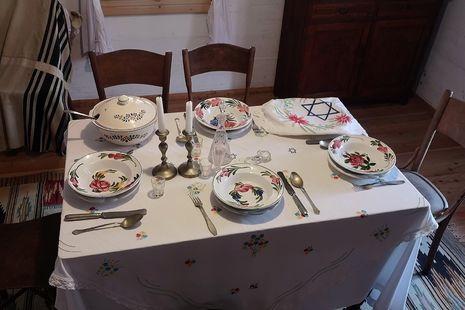Pressing pause: what Shabbat can teach Cambridge about rest
Eve Nicholls asks what a pre-ordained day of rest can teach Cambridge about burnout, balance, and switching off

At precisely 8:41 pm on Friday evening, the sun will begin to set over Cambridge and no-one will notice. Except, that is, for a small group of students, myself included, who will quietly power off their phones, slam their laptops shut, and hope that they remembered to leave the bathroom light on.
Shabbat, a dedicated day of rest from sunset on Friday until nightfall the next day, may be Judaism’s most distinctive tradition. Marked by candle-lighting, Friday night dinners (yes, like the TV show) and Challah bread and wine, its observance has long been central to Jewish practice. Orthodox Jews, in particular, follow specific conditions of rest that must be adhered to, including strict prohibitions against cooking, writing, shopping and using electricity.
The practice of Shabbat has been a continual source of fascination to my university friends. Once a week, they watch as I forswear all work and technology, only to return to my usual habits a mere day later, and so I am used to questions:
‘How do you see at night without turning the lights on? ’: a genius, albeit niche invention called the ‘Shabbat Lamp’, (look it up!). ’What does ‘nightfall’ even mean? ’: technically speaking, nightfall is the first moment when you can see three stars in the sky. Most frequent of all, however: ‘How can you take a day off from uni work every week? ’
The concept of a preordained Day Of Rest can seem unrealistic in a university criticised for its ‘toxic productivity culture’. Squeezing a week’s worth of work into six days is unlikely to be popular when seven rarely feel long enough. Indeed, finding the time to practise Shabbat is something I struggle with myself, particularly on Saturday nights spent in the library furiously trying to make up for lost time.
“Jude emphasises the benefits of pressing pause ‘regardless of the religious aspect’”
But for Jude, a third-year NatSci from Robinson, taking a day off each week turned out to be the unexpected answer to his struggles with burnout. Despite not following Shabbat laws strictly at home, he decided to try out a closer observance of Shabbat in his second year at Cambridge in an attempt to restore a healthy work-life balance: “I was looking for solutions and throwing everything at the wall to see what stuck”. Now he keeps his phone and work locked away once a week, something that came as a surprise to his flatmates and family. Characterising himself as “Shabbat-curious,” Jude emphasises the benefits of pressing pause “regardless of the religious aspect”.
This is an observation he shares with Naomi, a third-year English student at Homerton, who admits, “I almost don’t see it [Shabbat] as a religious thing anymore, more as a cultural thing”. For her, the biggest benefit of Shabbat is its role as a “check-in point,” something particularly pertinent in a university where the weekend has been eroded by a Thursday to Wednesday week structure. Having no control over Shabbat timings, however, remains a source of frustration for Naomi. This is a problem that becomes especially noticeable in the winter months, when shorter days bring earlier sunsets, meaning Shabbat can start as early as 3:30pm on a Friday afternoon.
Nillie, a second-year Chemical Engineering student at Jesus, similarly reflects on the implications of Shabbat for the rest of the week. Here, she draws out the polarity between rest and work that is characteristic of Shabbat at Cambridge, even coming up with her own term for it: “motzei, post-Shabbat madness”. Nillie explains that, with balance, Shabbat has been a positive practice for her. She professes that, “it’s insane, but it’s so healthy”.
This positive outlook, however, hasn’t stopped her from being aware of how observing Shabbat has shaped her time at university. With key events frequently falling on Friday evenings, Nillie has repeatedly found herself on the outside of a “normal uni experience,” unable to attend either of her matriculation or scholars’ dinners. In this way, Shabbat observance has served as a marker of difference for Nillie, consistent with the fact that only 0.7% of Cambridge’s resident population identified as Jewish in a 2021 census.
Above all, observance of Shabbat seems to have provided these students with an interesting lens through which to view and critique Cambridge’s often relentless work culture. Naomi asserts, “I don’t think it’s natural to work 24/7,” with Jude adding that the university’s atmosphere is “conducive to burnout”. As an external restriction, Shabbat forces these students to take a break and step away from their work, something that Naomi believes she would otherwise struggle to justify in an environment so obsessed with productivity.
“I wish that everyone had that opportunity to have a guilt-free break from work”
This need for rest and self-reflection is a perspective shared by Dalia, who hosts regular Shabbat lunches and events for students alongside the Jewish charity, Aish, all whilst completing her own medical degree. Whilst her current role requires a lot more preparation, Dalia notes the unique benefits of Shabbat for Cambridge students for whom “the hustle culture is particularly prominent”. Here, she reflects on the fulfillment she gains from giving students the time and space to sit amongst friends, without distraction. Dalia echoes Naomi in her conviction, agreeing that “I wish that everyone had that opportunity to have a guilt-free break from work”.
Pressing pause does not have to be a solely religious or cultural endeavour. In fact, the recent Review of Teaching’s proposals to restrict supervision times to between 8am and 8pm and a reconsideration of Saturday lectures bear a striking resemblance to the practice of Shabbat in their efforts to designate periods of rest and work. I can’t help but wonder if there is something to be said for taking an hour or even a minute out of our busy weeks to pause and reflect on ourselves.
 News / Judge Business School advisor resigns over Epstein and Andrew links18 February 2026
News / Judge Business School advisor resigns over Epstein and Andrew links18 February 2026 News / Hundreds of Cambridge academics demand vote on fate of vet course20 February 2026
News / Hundreds of Cambridge academics demand vote on fate of vet course20 February 2026 News / Petition demands University reverse decision on vegan menu20 February 2026
News / Petition demands University reverse decision on vegan menu20 February 2026 News / CUCA members attend Reform rally in London20 February 2026
News / CUCA members attend Reform rally in London20 February 2026 News / Gov grants £36m to Cambridge supercomputer17 February 2026
News / Gov grants £36m to Cambridge supercomputer17 February 2026










